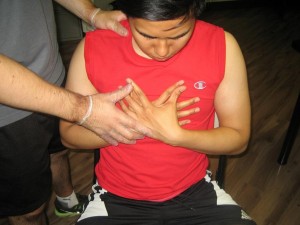Overview
Individuals with asthma often live with swollen airways. Medicines are available to stop the airways from constricting. Sometimes, however, certain substances can exacerbate the airways, and they might begin to inflame, constrict, and stop air from flowing through the lungs. These triggers, referred to as allergens, can consist of substances such as pollen, pet hair, smoke, or mildew spores. When you breathe in an allergen, your body reacts by swelling and inflammation in the bronchial tubes and airways. This can result in becoming out of breath and breathing complications.
Causes of Allergic Asthma

Allergens generate allergic asthma. Most frequent allergens do not usually cause injury to people. If you are not sensitive to the substance, you might inhale it and not see any complications. That’s not correct for individuals with allergic asthma, though. Allergic asthma patients might start noticing asthma symptoms soon after exposure to the substance or allergens.
The most expected allergens consist of:
- Pet hair.
- Cockroach faeces.
- Dust mites.
- Gasses or odors.
- Fluctuations in the climate.
Symptoms of Allergic Asthma
- Consistent coughing.
- Trouble breathing.
- Chest feels constricted.
- Breathing is fast or irregular.
- Lack of breath.
- Sore chest.
Treating Allergic Asthma
There are three kinds of medicines that can be used to treat allergic asthma. One kind treats your body’s response to the substance or allergen. The other two kinds of medication treat asthma and the lungs.
The most frequently used allergy medications consist of:
- Allergy inoculations: Immunotherapy can slowly decrease your body’s immune reaction. To do this, an immunologist will inoculate you with tiny quantities of an allergen over an extensive amount of time. Ultimately, your immune system will not react excessively to the existence of that specific allergen.
- Antihistamines: These medicines can decrease the immune system’s allergic reaction to a substance.
- Nasal sprays: Nasal sprays, dependent on the medicines they contain, usually relieve allergy symptoms.
- Eye drops: These droplets can clean allergens from the eye and depending on the medicines they contain, might stop allergic symptoms such as wet, inflamed eyes.
- Topical treatments: Creams and ointments can relieve allergy symptoms that disturb your skin, such as itching and hives.
- Immunomodulators: These medications work to subdue the immune system and stop a defective overreaction caused by a substance.
- Oral corticosteroids: This kind of medication can treat a serious allergic reaction and might be used for emergency treatment.
Exercise – Training with Asthma
Is asthma stopping you from working out? Asthma doesn’t have to though. Determine which types of exercise are best for individuals with asthma and how to manage your asthma whole exercising.
